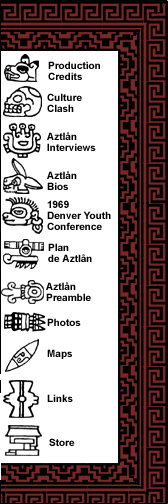

IN SEARCH OF AZTLÁN
Rudolfo Anaya Interview
October 16, 2000
Q: Rudy, what was the importance of Alurista’s
Plan de Aztlán to the emerging Chicano movement of the 1960's?
A: When Alurista first came out with the Plan de Aztlán, what he
did is he found the term "Aztlán." And it became very
important because that term is the name of the homeland of indigenous
Americans. And so as the Chicano movement grew closer and identified more
with their indigenous heritage, we begin to look for the homeland, which
is Aztlán.
Q: Could you tell us a little bit about the peregrinación, the
whole myth of the story of Aztlán, and how the Mexicas came to
found Mexico City?
A: There is a great migration that took place in what we call the Americas,
from south to north. And we know very little about these migrations, other
than the people left their stories. Left their legends. Left their mythology.
And that’s where we find Aztlán.
Many of these people spoke about their original homeland. And they described
it. There were seven caves; there was a hump-back mountain; and there
we stopped. Was that the beginning? Was that the birth of the people?
Or was that a stop on the migration?
Whatever it is, it becomes important because it's a place where they came
into, I believe, a new consciousness. Whether they were born for the first
time or born into a new level of consciousness, it's very very important.
And that’s why we as Chicanos found that myth--and here I mean "myth"
not as a fairy tale or a fiction, but as story. As legend. The most important
thing I think we could have done, during the Chicano Movement, is to recognize
those legends and those myths. Of course at that time as you know, we
were more involved in social political actions, for farm workers, for
students at the universities, for communities, and I think at that time
we weren’t paying close enough attention to the myth, to the story
that identifies us.
Q: Is Aztlán important to Chicanos in terms of identity? What does
it tell us about who we are? Why was it so important in the '60's? And
does it continue to be important today?
A: The myth of Aztlán was important in the 60's because we had
become a displaced people. We were losing our language; we were losing
our culture. We didn’t have access into positions of power in the
society. And so we had to find [a] way to turn that around. And one way
to do it was to say "we have been here a long time. This, this is
our land. We belong here. Our ancestors, our great great ancestors, lived
here, passed through here," and that became a rallying cry that suddenly
we could find a way to say "aquí estamos,"(here we are)
you know? "Esta tierra es nuestra (This land is ours)." And
call it Aztlán, even though it resides in myth and, as I’ve
said, myth is important. It’s the stories of our ancestors.
Q: In what way was it empowering to our sense of identity?
A: Well, once you have a sense that you belong, that a place is yours,
of course it empowers your sense of identity, because you’re no longer
a stranger in your own land. You can say, no, that these stories from
long ago tell me that my ancestors lived here, and I belong here. And
if I belong here, then I also partake in the fruits of the land. And I'm
not [going to] be a second class citizen.
Q: You’ve compiled a book of essays called Aztlán: Essays
on the Chicano Homeland. What inspired you to write the book?
A: I asked Francisco Lomali to help me edit a book to gather essays that
had been written on the subject of Aztlán. What we discovered was
that a great number of scholars and people had written about Aztlán
from a variety of viewpoints. And that was very interesting that people
had many different things to say about this power myth. I, myself, wrote
an essay [about] communities [needing] a sense of belonging. Of identity.
And in the '60's and '70's, we found that not only around the word "Chicano,"
which empowered us, made us distinct, but we found that around the idea
of Aztlán, which gave us back the homeland, [which] really had
been taken away from us. It made us feel that we didn't belong. And that
was a great sense of power. Not only a sense of power that we could take,
let’s say, to the streets, to social protest, but a great deal of
spiritual power. Which, to me, is more important.
Q: Could you talk about the spiritual aspects of Aztlán that inspired
your own writings?
A: One of the reasons I understood the potential of the myth of Aztlán
is because, as a New Mexican, I have always been very rooted in my land.
And a great deal of my creative imagination, my energy, my subject matter,
my fuente (fountain), you know, [comes] out of this land that my ancestors
had been on for a long time. And so I had [an] easier, let’s say,
connection to cuentos (stories), to the power of stories, of legend of
myth, than perhaps the urban Chicano. Who is a little more separated from
la raiz de tierra (root of the land), you know? So, to me, the idea of
la tierra is very powerful, because it’s from that landscape, it’s
that tierra that feeds my spiritual sense of who I am and where I belong
and my potential and what I can do.
.NEXT>>